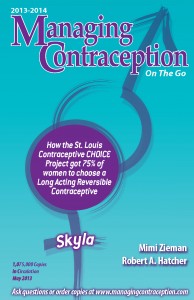Q:       Hello, I have a question about postpartum birth control. My patient is a 29 year old who just had her first baby (vaginal birth). She is exclusively breastfeeding. Her pre-pregnant BMI was 45. Because of her weight, one of my partners thought it would be better (more effective) for her to take combined oral contraceptives over progestin-only pills. In terms of safety, COCs at 1 month postpartum (PP) seem acceptable per US MEC, but I have never heard that this is recommended. Can you speak to the recommendation of using COCs over POPs in very obese patients, efficacy wise?
Thank you!
A: Â Â Â Â
| There is no time a woman is more at risk for a deep vein thrombosis than when she is postpartum. If she is less than 21 days postpartum (PP) the CDC Medical Eligibility Criteria suggest that she is in Category 4 meaning that she has a condition that represents an unacceptable health risk if she uses a combined hormonal contraceptive (pill, ring or patch with estrogen).A postpartum woman who is 21 to 42 days postpartum) and had a very high BMI (45 just prior to this pregnancy) would NOT be a good candidate for combined birth control pills according to the CDC’s revised Medical Eligibility Criteria. In this case the CDC Medical Eligibility Criteria suggest that she is in Category 3: She has a condition for which the theoretical or proven risks of using an estrogenic contraceptive generally outweigh the advantages of using these methods and use of these methods is usually NOT recommended. Use of a pill, ring or patch with estrogen should generally NOT be used.If from days 21 to 42 PP she in addition also had a significantly elevated blood pressure as well as her elevated BMI, it would be even less desirable for her to use an estrogenic contraceptive (perhaps WHO/CDC: 4)
Progestin only pills are ranked as just as effective as combined pills so they would be a perfectly acceptable methods for your patient. More effective would be a levonorgestrel IUD (Mirena or Skyla), of course. . |
US/CDC Medical Eligibility Criteria categories for temporary methods:
- US/CDC MEC: 1 – Can use the method. No restrictions on use.
- US/CDC MEC: 2 – Can use the method. Advantages generally outweigh theoretical or proven risks. If method is chosen, more than usual follow-up may be needed.
- US/CDC MEC: 3 – Should not use the method unless clinician makes clinical judgment that the patient can safely use it. Theoretical or proven risks usually outweigh the advantages of method. Method of last choice, for which regular monitoring may be needed.
US/CDC MEC: 4 – Should not use the method. Conditions represents on unacceptable health risk if method is used.
REFERENCES:
Zieman M, Hatcher, RA and Allen AZ Page A-3 of Managing Contraception 2016-2016. The numbers in the Medical Eligibility Criteria were developed under the watchful attention of Dr. Kate Curtis of the CDC, to whom the 2015-2016 edition of Managing Contraception is dedicated.
Curtis KM, Peterson HB U.S. Medical Eligibility Criteria p. 83 IN Hatcher, RA, Trussell et al Contraceptive Technology 20th Edition 2011
Trussell J, Guthrie KA Choosing a Contraceptive IN Hatcher, RA, Trussell et al Contraceptive Technology 20th Edition 2011, p 50
Also go to CDC.gov and type in MEC or Medical Eligibility Criteria
I am most interested in learning what you decided to do. Â Please let us know.
Robert A. Hatcher MD, MPH
Emeritus Professor of Gynecology and Obstetrics
Emory University School of Medicine
Atlanta, GA
To learn more about the advantages and disadvantages of combined birth control pills, rings, patches, the Mirena IUD, or Skyla IUD, go to: www.managingcontraception.com.  You can order all of these books listed below from our website or by calling 404-875-5001.Â
Key Words:Â Â Â Â Â postpartum, birth contorl, vaginal birth, breastfeeding, weight, effective, combined oral contraceptives, progestone-only pills, safety, CDC, US Medical Eligibility Criteria, candidate, patches, rings, deep vein thrombosis, unacceptable health risk, estrogen, elevated blood pressure pills, levonorgestrel Mirena IUD, Skyla IUD, Managing Contraception, Dr. Kate Curtis, Curtis Peterson MD, Contraceptive Technology, James Trussell MD, K.A. Guthrie MD, Choosing a Contraceptive, R.H. Hatcher, Mimi Zieman MD, A.Z Allen MDÂ Â Â
Current Books:
Contraceptive Technology 20th edition
Managing Contraception 2015-2016 edition
Choices 2014 edition
 Â Â
  
Â
